On the road to Albania with Eugène Pittard and Noëlle Roger in 1921
The unpublished story of a shared passion
Chantal Courtois

ETHPH 412925. Eugène Pittard et Noëlle entourés de leurs hôtes. Tirana, 1921

ETHPH 413029. Noëlle Roger écrivant lors d'une halte vers Petrelë, 1921
Eugène Pittard
His commitment to the recognition of Albania as a nation in 1920 and his active contribution to the founding of the Albanian Red Cross in 1921 will forever mark the ties uniting Eugène Pittard and, through him, Switzerland, to Albania. His first contact with the Albanian people was in Romania, where he conducted his research in physical anthropology (1899-1905).
In the aftermath of the First World War, Albania was caught in the stranglehold of the great powers, threatened or invaded on all its borders and torn apart from within. Eugène Pittard made a selfless commitment to the country he loved so dearly.
Appointed Honorary Consul General of Albania in Geneva, he took part in the work of the Paris Peace Conference (1919-1920) to defend the rights of Albania in the establishment of the new borders of Europe.
In his mission as spokesman to the young League of Nations, he will play an indisputable role in the admission of Albania to the League of Nations on 17 December 1920.
Between August and October 1921, Pittard and his wife travelled on horseback through Albania, venturing into the most inaccessible regions, he with his camera and her notebook. In doing so, the couple familiarizes themselves with the country, meets the most isolated populations, and prepares for future humanitarian missions.
On 4 October 1921, in Tirana, he founded the Albanian Red Cross, of which he became the official representative to the International Committee of the Red Cross in Geneva.
Noëlle Roger
Writer and journalist Hélène Dufour (1874-1953), from her pen name Noëlle Roger, married Eugène Pittard in 1900. Author of novels, she developed her taste for travel literature by accompanying Pittard on his anthropological missions in the Balkans. Turkey inspired her to write The Road to the East. First contact with the Turkish soul, published in 1914.
At the outbreak of war, she took nursing courses and, with her diploma in her pocket, she went to treat soldiers at the 101 Military Hospital in Lyon. Abandoning romantic themes, she described her daily life and the words of the wounded in Les Carnets d'une Infirmière in 1915, followed by other writings on the war and its consequences. From the 1920s onwards, she made a name for herself with a series of works of fiction marked by post-war pessimism (Le nouveau déluge, Le nouvel Adam, Le Soleil Enseveli...).
Her taste for the elsewhere and her sense of commitment led her to Albania alongside Eugène Pittard, for a first voyage of discovery in Albania between August and October 1921, then in March-April 1924, for a supply mission under the aegis of the Red Cross. While Pittard left the anthropologist's role as an observer in brackets in order to fully fulfil his diplomatic action, Noëlle Roger notes tirelessly, documents scrupulously, thus delivering a capital testimony on this country torn apart by the Balkan wars in the aftermath of the First World War.
Her travel notes are at the same time documentary, historical collection, travel guide, full of details on the geography, monuments, way of life and age-old traditions of the Albanian people.
We discover the important role Noëlle Roger played in the field by participating in the creation of the Albanian Red Cross, in the 1924 supply mission and by publishing numerous articles on the situation in Albania in real time.
In 1940, she published A Light on the World. The International Red Cross, 200 pages of Red Cross history from its beginnings to the outbreak of the 1939-1945 war.

Enveloppes des négatifs annotées par Eugène Pittard (numérisation MEG)
The eye and the feather
This document is based on images and words that have been waiting to be conjugated for almost a hundred years, reviving the memory of a common passion, that of the Pittard couple for Albania. By chance, this sharing of archives coincides with an important anniversary for Albania, that of the centenary of its entry into the League of Nations in December 1920. Beyond time, these unpublished images, which bring back to life a crucial period in its history, go first and foremost to the Albanian people for whom the Pittard couple intended them.
The Pittard collection contains 237 photographs of Albania, at least 200 of which were taken during the trip from August to October 1921, the remaining images may just as well have been taken in 1924. A recent inventory has brought the 1921 negatives closer to the envelopes that contained them, annotated by Eugene Pittard. Place names and brief descriptions are included. In the absence of the shooting date, the itinerary was reconstructed from the notes in Noëlle Roger's 1921 travel journal and the resulting articles published in 1922. In the final version, the writer substantially reconstructed the order of the journey, highlighting the high points of Albanian history and describing the sites and landscapes crossed. Some places attested by the images, such as the region of Scutari, do not appear in the thread of the story but are mentioned in the last part of the article devoted to the facts of war and resistance, which she had meticulously detailed in her travel diary.
Material and source
- Eugène Pittard Photographic collection (MEG), Albania. 65 images selected from the 237 glass plates and soft negatives, scanned and inventoried in the Musinfo photo library.
- Noëlle Roger fonds (BGE)
- Noëlle Roger, Carnet de voyage, 1921; "Sur les chemins de l'Albanie", Revue des deux mondes, Sept. 1922: I, p. 89-112, II, p. 420-442.
- Scanning: Memoriav
- Collaboration of Léa Jaurégui
- All the images and documents reproduced here are from the Eugène Pittard Collection, property of the City of Geneva. All rights are reserved and any reproduction is forbidden without the explicit authorisation of the Museum of Ethnography of Geneva.
In her narration, Sur les chemins d'Albanie (1922), Noëlle Roger emancipates herself from the itinerary followed with Eugène Pittard in 1921 in order to privilege the history that the places inspire her.
Part I: First contacts
1. Durrës; 2. Tirana, the capital; Albania facing Europe; The memory of Scanderberg (3. Krujë, 4. Petrelë, 5. Lehzë); 6. A historical town, Lushnja
Part II
7. The Byzantine city (Berat); 8. The God Tomor; The southern border (9. Vlorë, 10. Himarë, 11. Tepelenë, 12. Gjirokastër, 13. Leskovic, 14. Korçë, 15. Lake Prespa; 16. In the heart of Albania, Elbassan; 17. On the road to Dibra (this passage, dedicated to the resistance, brings together images of fighters from various places, some of which do not appear in the narrative).
On the road to Albania

ETHPH 420771. Durrës
«Une tâche claire se dessine contre une colline basse et pelée, dominant un vaste golfe: c’est Durazzo. [...] . Toute la lumière d’Orient semble venir à la rencontre du navire sur les eaux d’un bleu allègre. Cependant, la nappe d’azur est trouée en trois endroits. Des sommets de mâts émergent, un morceau de bastingage, une cheminée morte : trois navires qui furent coulés en rade de Durazzo pendant la guerre.»
«A clear spot against a low, bare hill overlooking a wide gulf is Durazzo. […] . All the light of the East seems to meet the ship on the light blue waters. However, the azure sheet is perforated in three places. Mast tops emerge, a piece of rail, a dead chimney: three ships that were sunk in Durazzo's roadstead during the war.»

ETHPH 412926. Durrës
«Et, tout au bord de l’eau, ces larges ruines, ces murs spacieux percés de trous, c’est le palais du prince de Wied que les obus autrichiens ont effondré. Tout au bord de l’eau... comme si le Roi inquiet eût à peine osé poser le pied sur le sol de son royaume.»
«And, right on the water's edge, these large ruins, these spacious walls pierced with holes, it is the palace of Prince de Wied that the Austrian shells collapsed. At the very edge of the water... as if the worried King had barely dared to set foot on the soil of his kingdom.»

ETHPH 420644. Durrës
«Le long des rues aux maisons basses qui descendent vers la mer, sur la place bordée d'échoppes à la mode turque, à chaque pas on retrouve le souvenir des heures troubles que Durazzo vient de traverser. Ici, il y avait des arbres, des jardins...»
«Along the streets with low houses that descend to the sea, in the square lined with Turkish-style stalls, with each step you find the memory of the troubled hours that Durazzo has just gone through. Here there were trees, gardens...»

ETHPH 420656. Durrës
«Au pied de la vieille muraille vénitienne qui grimpe la colline, on a dû creuser des abris pour mettre en sûreté les habitants, lors des bombardements.»
«At the foot of the old Venetian wall that climbs the hill, shelters had to be dug to keep the inhabitants safe during the bombings.»

ETHPH 420661. Tirana
«Au milieu de sa plaine, dans son amphithéâtre de montagnes désertes, Tirana élance ses minarets et ses cyprès séculaires qui apparaissent de très loin, émergeant d'une nappe de verdure arrêtée nette, comme un tapis jeté sur l'étendue rasée.»
«In the middle of its plain, in its amphitheater of deserted mountains, Tirana throws its minarets and its secular cypresses which appear from away, emerging from a sheet of greenery stopped neatly, like a carpet thrown on the razed expanse.»

ETHPH 413028. Tirana
«Tirana, avec sa physionomie pudiquement réservée, défendue contre les regards indiscrets par ses murs, ses jardins, ses moucharabieh, entourée de son passé aux aguets sous les sycomores géants ...»
«Tirana, with its modestly reserved physiognomy, defended against prying eyes by its walls, its gardens, its mashrabiya, surrounded by its past on the look-out under the giant sycamores...»

ETHPH 420696. Tirana
«... et les cyprès rangés à quelque distance, comme des sentinelles noires autour du lieu de prière, semble continuer une méditation ancienne.»
«... and the cypress trees lined up at some distance, like black sentinels around the place of prayer, seem to continue an ancient meditation.»

ETHPH 420695. Tirana
«La maison d'Essad, contiguë et entièrement détruite, se donnait l'apparence d'un château fort derrière ses épaisses murailles.»
«The house of Essad, adjacent and completely destroyed, gave itself the appearance of a fortified castle behind its thick walls.»

ETHPH 420760. Tirana
«Elle [Tirana] se souvient qu'elle eut pour origine la mosquée de Souleïman [...]. La mosquée et la maison des tombeaux dont les murailles sont décorées de fleurs peintes, d'arabesques, de fruits, de paysages. Des stèles peuplent tous les espaces libres [...]»
«She [Tirana] remembers that it originated in the mosque of Souleiman [...]. The mosque and the house of tombs whose walls are decorated with painted flowers, arabesques, fruits and landscapes. Steles populate all the open spaces [...]

ETHPH 412966 .Tirana
«Dans la maison des tombeaux, contiguë à sa mosquée, sous une coupole peinte, entouré de ses fils, Souleïman repose.»
«In the house of tombs, adjacent to his mosque, under a painted dome, surrounded by his sons, Suleiman rests.»

ETHPH 412921. Tirana
«Le jeudi, jour du marché, la ville change de physionomie. Dès l'aube, les pavés ont retenti sous le fer des chevaux, longues caravanes, descendues des montagnes, et qui apportent les marchandises confectionnées dans les lointains villages ...»
«On Thursday, market day, the city changes its appearance. From dawn, the cobblestones resounded under the horseshoes, long caravans, coming down from the mountains, and bringing the goods made in the distant villages...»
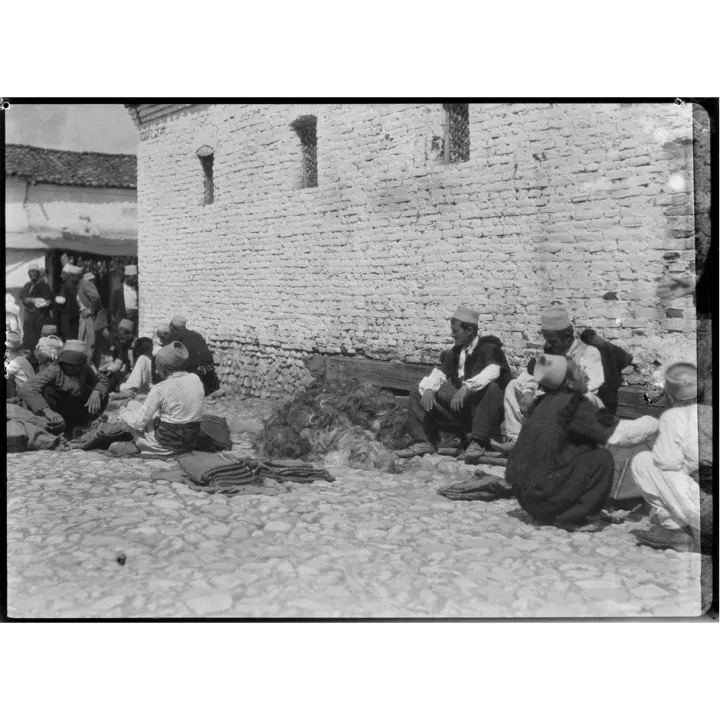
ETHPH 420654. Tirana
«... pièces de grosse laine tissée, couvertures en poils de moutons, nattes et tapis, cotonnades faites au métier, transparents tissus de soie, et aussi les costumes anciens ...»
«... pieces of thick woven wool, sheep-hair blankets, mats and carpets, loom-made cottons, transparent silk fabrics, and also antique costumes ...»

ETHPH 420636. Tirana
«... les velours chamarrés, les manchettes soutachées et brodées d'or, toutes ces étoffes prennent possession de la rue, s'amoncellent devant les femmes immobiles en jupes sombres, assises sur leurs talons, voilées de blanc ou de noir et, quelques-unes, le visage découvert.»
«... the colorful velvets, the cuffs stained and embroidered with gold, all these fabrics take possession of the street, pile up in front of the motionless women in dark skirts, sitting on their heels, veiled in white or black and, in some cases, with their faces uncovered.»

ETHPH 420634. Tirana
«Parallèle à ce marché des étoffes, le marché des grains envahit une place entière. Les hommes se tiennent accroupis entre les sacs de blé.»
«Parallel to this fabric market, the grain market is taking over an entire square. Men are crouching between the sacks of wheat.»

ETHPH 420653. Tirana
«Il semble que ce soit le soleil qui fasse tout le tapage, exaltant le ton vif des cotonnades, les rouges, les ors, le brillant des soies, les couleurs ardentes des fruits, les tas d'aubergines et de tomates écroulés à même le pavé.
«It seems to be the sun that makes all the noise, exalting the bright tone of the cottons, the reds, the golds, the brilliance of the silks, the fiery colours of the fruits, the heaps of eggplants and tomatoes crumbling on the pavement.»

ETHPH 420730. Vue plongeante sur la vallée d'Erzen / Plunging view of the Erzen Valley
«On suit à cheval la longue plaine que coupent les ressauts successifs, on traverse à gué la rivière et l’on grimpe des âpres flancs [...]»
«One follows on horseback the long plain cut by the successive springs, one fords the river and climbs steep slopes [...]»
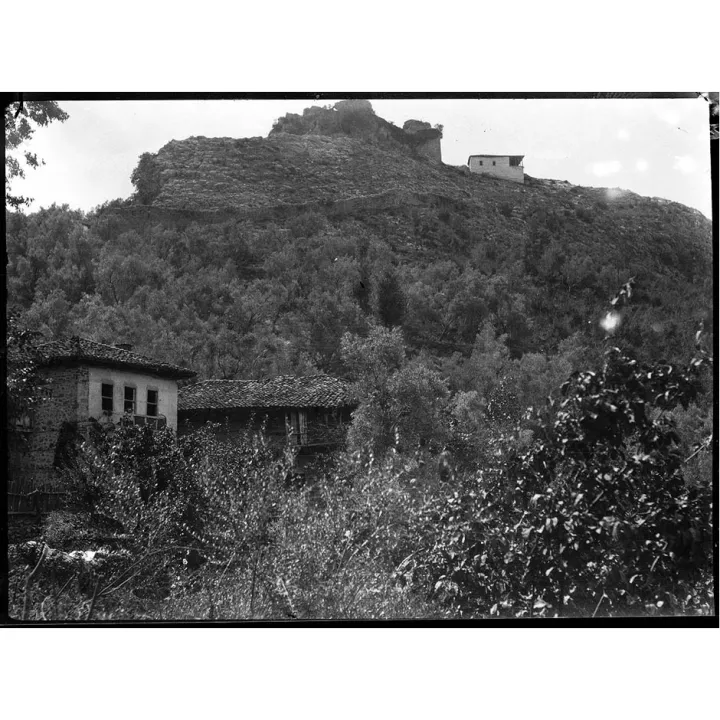
ETHPH 413026. Petrelë
«Pour compléter ce pèlerinage, on doit monter à Petrella, sur la montagne qui ferme le cirque de Tirana du côté de l’Orient, à l’autre extrémité de cette vallée que commande altièrement Kruja.»
«To complete this pilgrimage, one must go up to Petrella, on the mountain that closes the circus of Tirana on the eastern side, at the other end of this valley that Kruja commands proudly.»
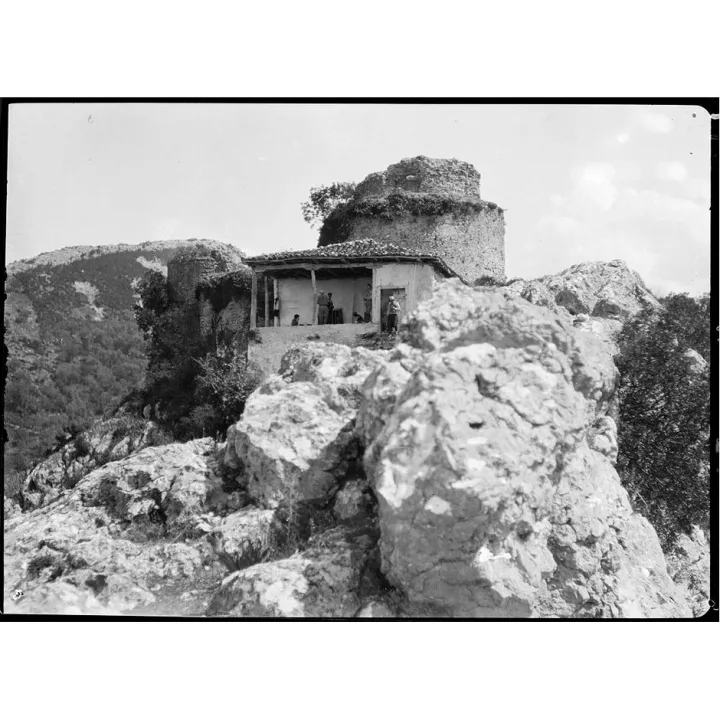
ETHPH 413031. Petrelë
«Point de route [...] et tout le paysage que contemple la tour trapue est inondé d’une tendresse qui contraste avec les rudes montagnes [...]»
«Waypoint […] and the whole landscape that the stocky tower contemplates is flooded with a tenderness that contrasts with the harsh mountains [...]»

ETHPH 420666. La citadelle de Scanderberg à Lehzë / The citadel of Scanderberg in Lehzë
«[…] et la sévère sentinelle veillant au pied des parois de calcaire, la cité dont la destinée fixa la destinée de Scanderberg, et qui avait formé à son image l’âme du héros enfant […]»
«[…] and the severe sentry guarding the foot of the limestone walls, the city whose destiny determined the destiny of Scanderberg, and which had formed in its image the soul of the child hero [...]»
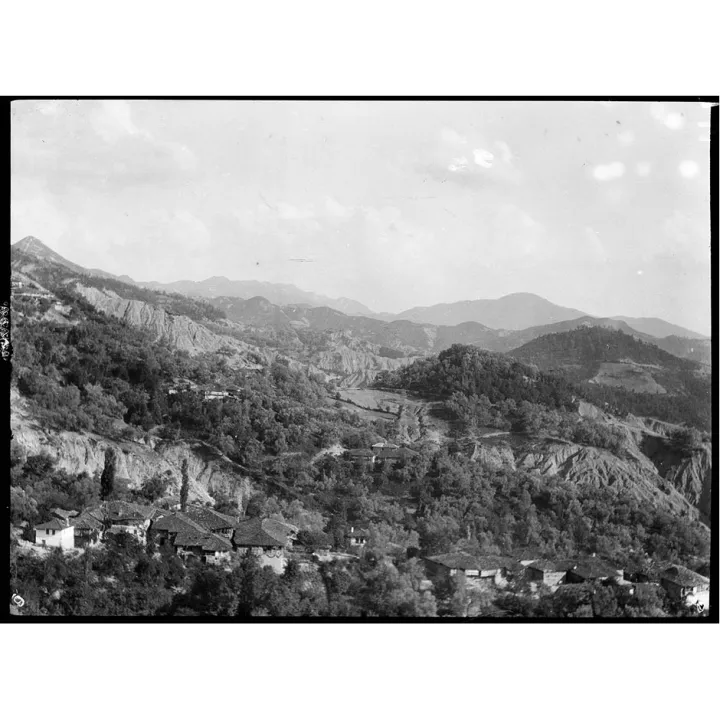
ETHPH 413030. Vue depuis le sommet de Petrelë / View from the top of Petrelë
«Le versant oriental domine un dédale de chaînes de plus en plus confuses à l’horizon. Elles s’avancent les unes derrière les autres comme une série d’ouvrages de défense, une suite d’obstacles dressés successivement. On dirait des ébauches de montagnes recommencées à l’infini [...]»
«The eastern slope dominates a maze of increasingly confused chains on the horizon. They advance one after the other like a series of defensive works, a succession of obstacles erected in succession. They look like mountain sketches started over again from scratch [...]»

ETHPH 420665. Lehzë
«[…]les montagnes d’Albanie sont autant de barrières posées devant les invasions, imprenables bastions qui enseignèrent aux hommes la résistance. Les Albanais ont bien reconnu l’expression même de leur sol et de leur âme en Scanderberg dont toute la vie fut une résistance victorieuse.»
«[…]the mountains of Albania are as many barriers placed in front of the invasions, impregnable bastions that taught men resistance. The Albanians recognized well the very expression of their soil and soul in Scanderberg, whose whole life was one of victorious resistance.»

ETHPH 420678. Plaine de la Mysakja / Plain of Mysakja
«Et nous sommes entrés dans la Mysakja, une plaine immense, qui, de la baie de Durazzo aux lagunes de Valona, s’enfonce à l’intérieur comme un vaste triangle dont le sommet s’effile entre les montagnes [...]»
«And we have entered the Mysakja, an immense plain which, from the bay of Durazzo to the lagoons of Valona, sinks into the interior like a vast triangle whose summit tapers between the mountains [...].»

ETHPH 420762. Traversée du Shkumbin / Crossing the Shkumbin
«Traversée au Nord par les méandres gris du Skumbin qui sépare l’Albanie tosque de l’Albanie guègne, au Sud par le Semeni, empoisonnée de moustiques et de malaria, [...] , la Mysakja est une des régions les plus fertiles du monde.»
«Crossed in the North by the grey meanders of the Skumbin which separates Tuscan Albania from Guègne Albania, in the South by the Semeni, poisoned by mosquitoes and malaria, [...], Mysakja is one of the most fertile regions in the world.»
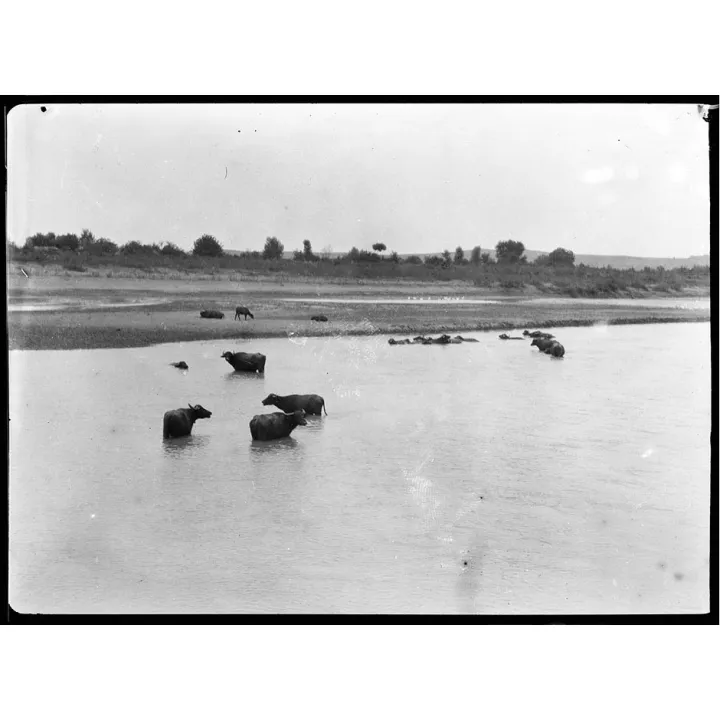
ETHPH 413013. Buffles dans le cours d’eau Shkumbin / Buffalo in the Shkumbin stream
«Cependant, on a l’impression d’un désert en franchissant ces étendues incultes, livrées aux troupeaux, et où les plantes steppiques succèdent à celles des eaux stagnantes. Rares sont les villages le long des ondulations qui la bordent ...»
«However, one has the impression of a desert as one crosses these uncultivated expanses, left to the herds, and where steppe plants succeed those of stagnant waters. Few are the villages along the undulations that border it ...»

ETHPH 412918. Maison où se tint le Congrès de Lushnjë en janvier 1920 / House where the Lushnjë Congress was held in January 1920
«Lushnja, solitaire et ramassée sur sa colline, ressasse un grand souvenir. Au début de 1920, 68 délégués de toutes les parties de l’Albanie se réunirent à Lushnja, se constituèrent en Assemblée nationale, et déclarèrent déchu le gouvernement provisoire de Durrazo, nommé par l’Italie.»
«Lushnja, lonely and cramped on her hill, recalls a great memory. At the beginning of 1920, 68 delegates from all parts of Albania met in Lushnja, formed a National Assembly, and declared the provisional government of Durrazo, appointed by Italy, deposed.»

ETHPH 420755. Bérat
«Adossée aux premières marches de ce puissant massif du Tomor qui domine l’Albanie centrale, la ville de Bérat enjambe le fleuve Ossum, étageant le long des rives en gradins ses toits de tuile, ses façades blanches qu’on dirait posées les unes sur les autres.»
«Leaning against the first steps of this powerful Tomor massif that dominates central Albania, the town of Bérat straddles the Ossum river, with its tiled roofs and white façades that seem to be placed one on top of the other along the banks of the river.»

ETHPH 420684. Bérat
«Bordant le fleuve, autour du bazar et des mosquées, les maisons musulmanes s’enferment dans leurs jardins. [...] . Le maire parle de reconstruire le beau pont de pierre qui fut détruit par les Serbes.»
«Bordering the river, around the bazaar and the mosques, the Muslim houses lock themselves in their gardens. […] . The mayor talks about rebuilding the beautiful stone bridge that was destroyed by the Serbs.»
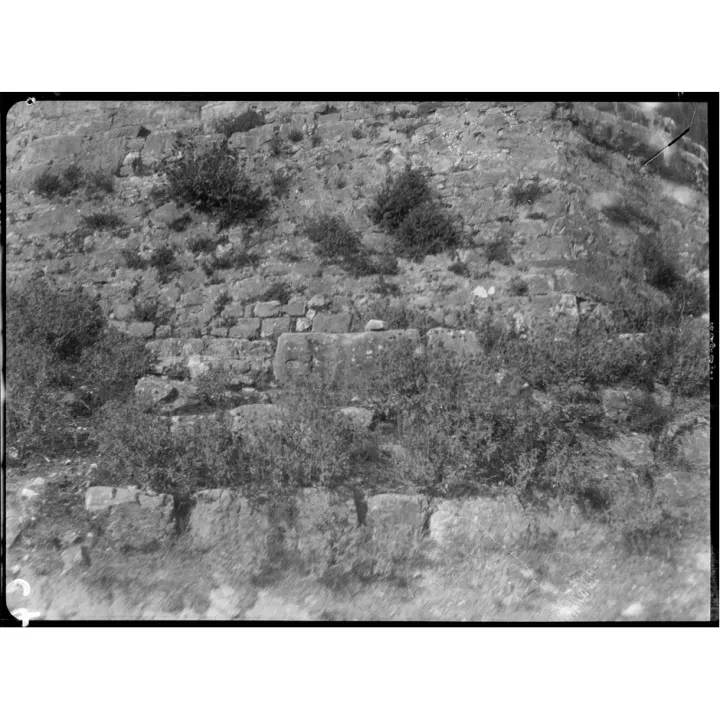
ETHPH 420689. La citadelle de Bérat / The citadel of Bérat
«Une citadelle, aperçue de très loin, couronne la colline nue où Bérat s’appuie, et ses vieux murs enferment tout un quartier, la cité chrétienne. [...]. A la base, les puissantes dalles cyclopéennes s’emboîtent les unes dans les autres.»
«A citadel, seen from afar, crowns the bare hill on which Berat leans, and its old walls enclose an entire district, the Christian city. [...]. At the base, the powerful cyclopean slabs fit into each other.»

ETHPH 412933. La citadelle de Bérat / The citadel of Bérat
«Une porte voûtée s’ouvre dans le mur où toutes les périodes de l’histoire ont apporté leur pierre [...].»
«A vaulted door opens into the wall where all periods of history have contributed their stone [...].»
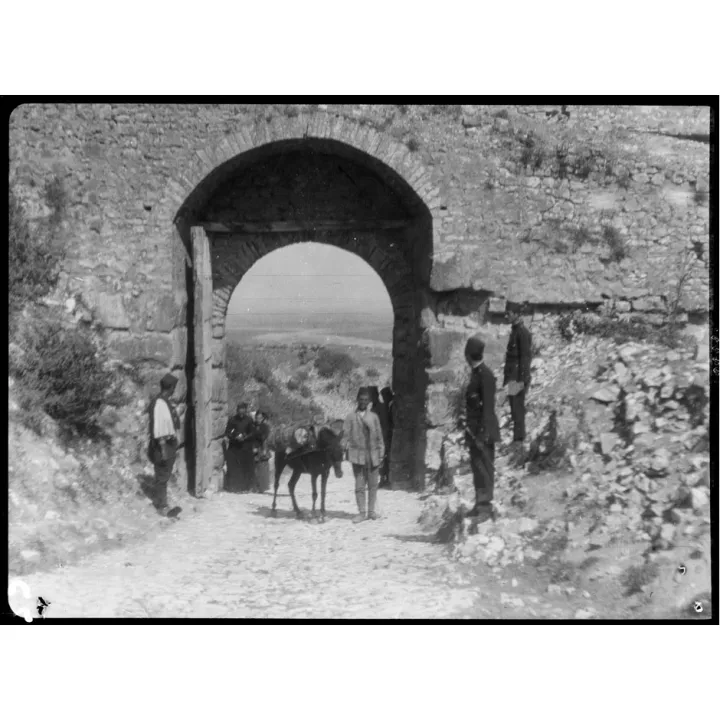
ETHPH 420690. La citadelle de Bérat / The citadel of Bérat
«Sitôt qu’on l’a franchie, on se trouve transporté à des siècles de distance, dans la bourgade byzantine demeurée intacte, dédale de ruelles qui s’enchevêtrent autour de la colline.»
«As soon as you cross it, you find yourself transported centuries away, to the unspoilt Byzantine village, a maze of alleys tangled around the hill.»

ETHPH 420688. La citadelle de Bérat / The citadel of Bérat
«Cette bourgade de 700 habitants ne possède pas moins de vingt-cinq églises, datant toutes de l’époque byzantine. [...]. On pourrait, pendant toute la journée, aller de l’une à l’autre, sans arriver à dresser l’inventaire de si nombreux trésors.»
«This village of 700 inhabitants has no less than twenty-five churches, all dating from the Byzantine era. [...]. We could go from one to the other all day long, without being able to draw up an inventory of so many treasures.»
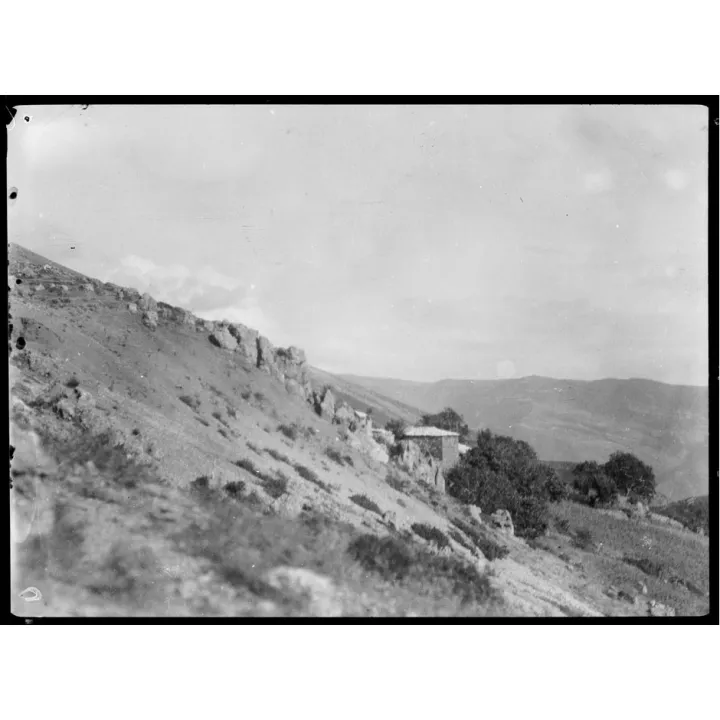
ETHPH 420744. Vers le Mont Tomor / To Mount Tomor
«Notre caravane traversant la plaine brûlante et franchissant, l’un après l’autre, tous les hauts contreforts escarpés, couverts d’arbousiers, d’arbres de Judée où s’accrochent les vignes sauvages [...].»
«Our caravan crosses the burning plain and crosses, one after the other, all the high steep buttresses, covered with strawberry trees, Judean trees where the wild vines cling [...].»

ETHPH 413023. Le couvent Bektachi / The Bektachi convent
«[...] et tout à coup, la lumière du couvent Bektachi, ce point de feu, posé si haut, qui nous appelle, cette lumière humaine, après tant d’obscurité et de solitude. Combien de temps sembla-t-elle reculer devant nous ?»
«[...] and suddenly, the light of the Bektachi convent, that point of fire, set so high, which calls us, that human light, after so much darkness and solitude. How long did it seem to retreat before us?»

ETHPH 420659. La confrérie Bektachi / The Bektachi brotherhood
«Et puis l’arrivée. Les formes blanches des derviches rangées sur l’escalier [...]»
«And then the arrival. The white forms of the dervishes lined up on the stairs [...]»

ETHPH 420746. Baba Ilias de la confrérie Bektachi / Baba Ilias of the Bektachi brotherhood
«Baba Ilias a revêtu pour la photographie, son costume de guerre, le manteau brun par-dessus la robe blanche, et la hache à double tranchant. Son visage spiritualisé sourit, ses yeux brillent. Et nous songeons au pouvoir mystérieux de cet homme, qui, d’un mot, lève des centaines de volontaires prêts à mourir... .»
«Baba Ilias put on his war costume, the brown coat over the white dress, and the double-edged axe for the photograph. His spiritualized face smiles, his eyes shine. And we think of the mysterious power of this man, who, in a word, raises hundreds of volunteers ready to die…»

ETHPH 420697. Au Mont Tomor / At Mount Tomor
«A présent, c’est le chaos de schistes où vivent seuls quelques pins tourmentés par les vents. Vraiment, l’air du Tomor guérit la fièvre ! Et ces grandes vagues de brouillard qui montent par intervalles, avec quelles délices nous respirons leur humidité fraîche !»
«At present, it is the chaos of shales where only a few pines live, tormented by the winds. Really, the air of the Tomor cures fever! And these great waves of fog that rise in intervals, with what delights we breathe their fresh humidity!»

ETHPH 420749. Au Mont Tomor / At Mont Tomor
«Le Tomor, couronné de nuages ... disait déjà Homère. Les derniers pins ont disparu depuis longtemps. Le sommet. Trois marches donnent accès à cette enceinte ronde, tapissée de plaques de gazon sec et où des mains pieuses ont déposé en offrande des poignées de blé [...]»
«The Tomor, crowned with clouds ... already said Homer. The last pine trees are long gone. The top. Three steps lead up to this round enclosure, lined with patches of dry grass, where pious hands have placed handfuls of wheat as an offering [...]»

ETHPH 420686. Traversée de l’Ossum / Crossing the Ossum
«La plaine sauvage se déroule, interminable, dominée par la silhouette solitaire et déjà lointaine du Tomor. Pour traverser l’Ossum, il faut atteler des buffles aux automobiles. [...] il fait nuit lorsque nous atteignons Valona (Vlora).»
«The wild plain unfolds, endless, dominated by the solitary and already distant silhouette of the Tomor. To cross the Ossum, you have to harness buffaloes to cars. [...] it is dark when we reach Valona (Vlora). The wild plain unfolds, interminable, dominated by the lonely and already distant silhouette of the Tomor. To cross the Ossum, buffaloes have to be harnessed to cars. ...] it is dark when we reach Valona (Vlora).»

ETHPH 420774. Vlorë
«Au bord de sa baie calme comme un lac, protégée par la longue pointe de Linguetta et par le rocher désert de Saseno, Vlora abrite ses maisons blanches et ses mosquées au pied des collines couvertes d’oliviers, première marche de ce nœud de montagnes qui la séparent de la vallée d’Argyrokastro.»
«At the edge of its calm bay like a lake, protected by the long headland of Linguetta and by the deserted rock of Saseno, Vlora shelters its white houses and its mosques at the foot of the hills covered with olive trees, the first step of this knot of mountains which separate it from the valley of Argyrokastro.»

ETHPH 412929. Environs de Vlorë/Surroundings of Vlorë.
«[...] Et sur la colline, proche de la citadelle, le village de Kanina, entièrement détruit, rappelle qu’on s’est battu tout autour de Valona. “Mahomet est à Dieu et Vlora aux patriotes” disent les Albanais.»
«[...] And on the hill, near the citadel, the village of Kanina, completely destroyed, reminds us that we fought all around Valona. "Muhammad belongs to God and Vlora to the patriots" say the Albanians.»

ETHPH 412943
Le couple Pittard célèbre la libération de Vlorë / The Pittard couple celebrates the release of Vlorë
«[...] les chefs de village se rencontrèrent un jour de mai, l’année dernière. Comme les Suisses du XIIIe siècle, réunis au Grutli, ils firent le serment de mourir ou de libérer leur sol. [...]. Au mois de septembre, Valona, libérée, appartenait aux patriotes.»
«[...] the village chiefs met one day in May last year. Like the Swiss of the 13th century, gathered in the Grutli, they vowed to die or to liberate their land. […]. In September Valona was liberated and belonged to the patriots.»

ETHPH 413019. Himarë
«A partir de Valona commence à se déployer la chaîne de la Chimère (Himara), où les fruits sont les plus beaux de l'Albanie: une longue barrière de montagnes regardant l'Adriatique. [...]. Leur chef-lieu est Himara, un beau village ombragé de chênes, sur un épaulement de la montagne, que nous atteignons à cheval.»
«From Valona begins to unfold the Chimera (Himara) range, where the fruits are the most beautiful in Albania: a long barrier of mountains overlooking the Adriatic. [...]. Their capital is Himara, a beautiful village shaded by oaks, on a shoulder of the mountain, which we reach on horseback.»
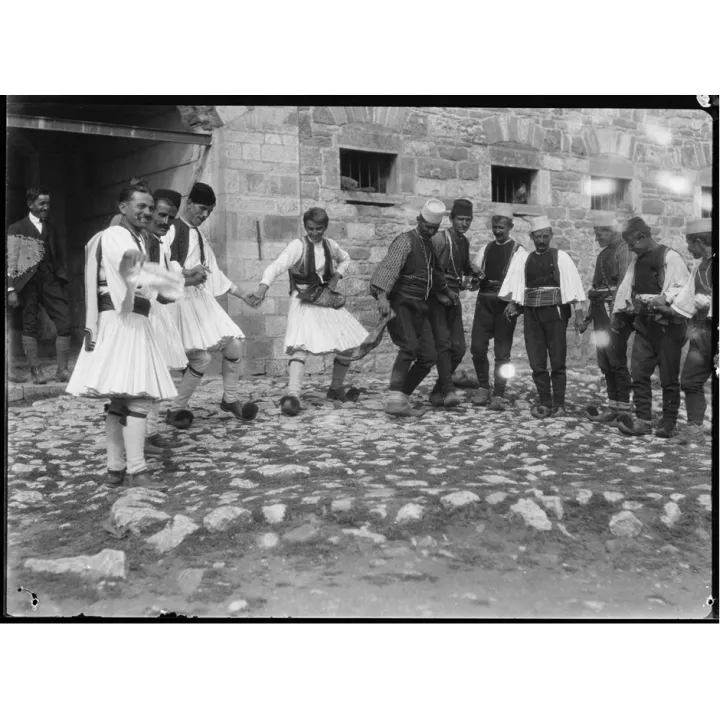
ETHPH 412923. Himarë
«Sur la place, les paysans dansent la danse nationale, la Pyrrhique, la danse de Pyrrhus, le divertissement préféré des Albanais. Les hommes se tiennent par la main et l'un d'eux conduit la file, tout en faisant tourner son mouchoir.»
«In the square, the peasants dance the national dance, the Pyrrhic, the dance of Pyrrhus, the favourite entertainment of the Albanians. The men hold hands and one of them leads the line, while spinning his handkerchief.»

ETHPH 412958. Himarë
«Ils exécutent un lent piètement comme s'ils terrassaient et écrasaient un invisible ennemi couché sous leurs pieds. Parfois le rythme se précipite, le chant devient cri de joie ou de victoire ou dure ironie, chant d'amour ou de guerre, les deux thèmes éternels qui s'expriment en accents presque identiques, rudes, sombres, amers ...»
«They execute a slow footwork as if they were knocking down and crushing an invisible enemy lying under their feet. Sometimes the rhythm rushes, the song becomes a cry of joy or victory or harsh irony, a song of love or war, the two eternal themes expressed in almost identical accents, rough, dark, bitter...»

ETHPH 412930. Tepelenë
«[...] la vallée d’Argyrokastro qui se resserre autour de nous, apparaît telle que les hommes l’ont laissée – couverte de ruines. [...]. On passe un col et l’on voit apparaître les murs béants de la citadelle de Tepeleni, chaos de pierre dressé sur le ciel. Tepelini, brûlée en juillet 1914, avait relevé tant bien que mal quelques-unes de ses ruines.»
«[...] the valley of Argyrokastro, which tightens around us, appears as the men left it - covered with ruins. […]. We pass a pass and see the gaping walls of the Tepeleni citadel appear, a chaos of stone standing on the sky. Tepelini, burnt down in July 1914, had raised some of its ruins as best it could.»

ETHPH 420642. Tepelenë
«Une partie de ses 4000 habitants essayaient d’y vivre, lorsqu’en décembre 1920, un tremblement de terre «parfit» la besogne des Grecs, bousculant ces décombres, mêlant ces ruines qui ne sont plus que des torrents de moellons...»
«Some of its 4,000 inhabitants were trying to live there when, in December 1920, an earthquake "perfected" the work of the Greeks, shaking up the rubble, mixing up the ruins which are now nothing more than torrents of rubble...»

ETHPH 420703. Tepelenë
«[...] des amas de blocs, enfermés dans les vieilles murailles encore debout, une confusion de débris où l’on chemine à grand peine. Jusqu’à l’eau du canal qui s’est perdue...»
«[…] piles of blocks, enclosed in the old walls still standing, a confusion of debris where one can hardly walk. Until the canal water is lost...»

ETHPH 412968. Gjirokastër
«Une foule silencieuse se porta devant la maison où flotte le drapeau suisse. De cette foule dont nous distinguions à travers les interstices des moucharabieh les costumes blancs et les faz, une voix disait en français: «Le soir nous avons reçu une bonne nouvelle: Vive la Suisse».»
«A silent crowd gathered in front of the house where the Swiss flag is flying. From this crowd, which we could see through the gaps in the mashrabiya, the white suits and the faz, a voice said in French: «In the evening we received good news: Vive la Suisse».» (Long live Switzerland).»
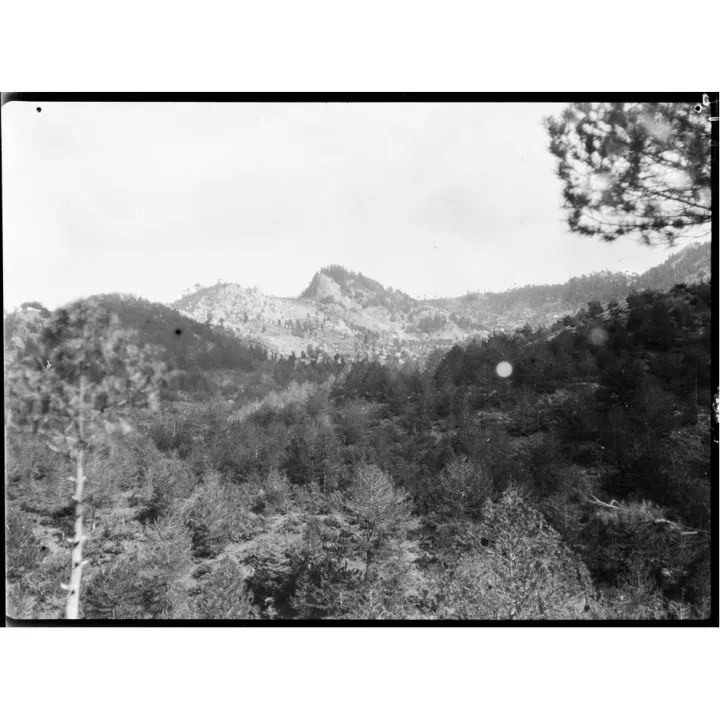
ETHPH 420768. Sur la route de Klissura / On the road to Klissura
«Par le défilé de Klissura, étroit, désert, formidable entaille que la Vjusa s’est creusée dans le roc, et où passa l’armée de Pompée, par la vallée de Premeti moins aride, célèbre pour ses vergers et que longe la chaîne déchiquetée des Nemerika...»
«Through the Klissura pass, narrow, deserted, formidable notch that Vjusa dug in the rock, and where Pompey's army passed, through the less arid valley of Premeti, famous for its orchards and along the jagged chain of the Nemerika...»

ETHPH 420767. Vue de Leskovic au lointain / View of Leskovic in the distance
«...par un dédale de hautes montagnes qu’il faut gravir, et puis descendre pour remonter encore [...], nous avons aperçu à une grande hauteur, une ville étrange, blanche d'un côté, sombre de l'autre, Ljaskoviki.»
«...through a maze of high mountains that you have to climb, and then go down to go up again [...], we saw at a great height, a strange city, white on one side, dark on the other, Ljaskoviki.»

ETHPH 412944. Vue de Leskovic / View of Leskovic
«En approchant, on reconnaît des décombres, un pêle-mêle de pierraille, immense cimetière de maisons; c'est le quartier musulman, naguère très riche, avec de beaux jardins et les somptueuses demeures des beys qui venaient, l'été en villégiature, respirer à mille mètres d'altitude.»
«As you approach, you can see the rubble, a jumble of rubble, a huge cemetery of houses; this is the Muslim quarter, once very rich, with beautiful gardens and the sumptuous homes of the beys who used to come to breathe at an altitude of a thousand metres during the summer holidays.»

ETHPH 413015. La ville de Leskovic en ruines / The ruined city of Leskovic
«Ici, on a nous a narré une effrayante histoire. En 1914, les frontières ayant été fixées par la Commission internationale, et les Grecs sommés de se retirer, les Albanais s'avancèrent pour occuper Ljaskoviki [...]»
«Here we were told a frightening story. In 1914, the borders having been fixed by the International Commission, and the Greeks having been ordered to withdraw, the Albanians advanced to occupy Ljaskoviki [...].»
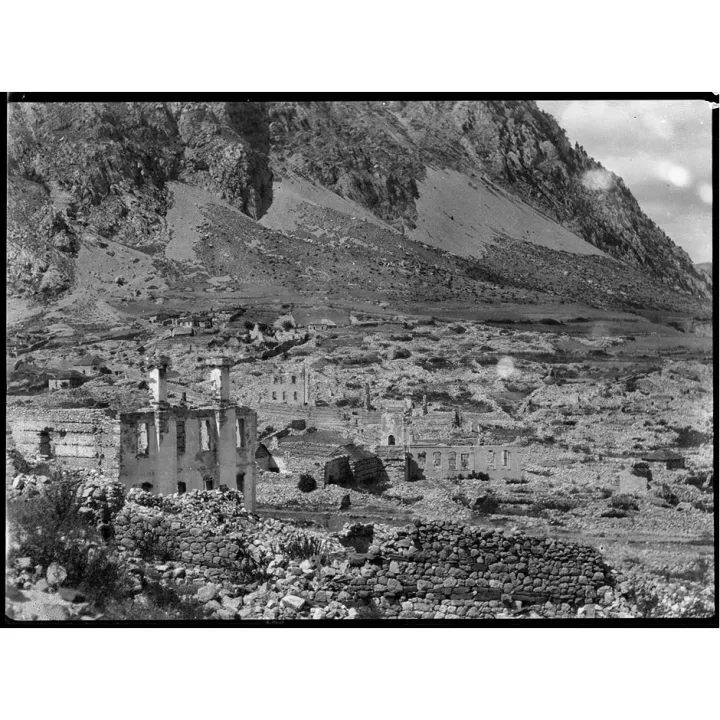
ETHPH 413016. La ville de Leskovic en ruines / The ruined city of Leskovic
«Dans ce champ de ruines confuses où aucune ne garde la figure d'une maison, on évoque les cités martyres de la France dévastée. Pendant des heures et des heures, cette évocation ne cessera de flotter devant nos yeux.»
«In this field of confused ruins where none of them keep the figure of a house, one evokes the martyred cities of devastated France. For hours and hours, this evocation will never cease to float before our eyes.»

ETHPH 412959. Korçë
On passe un dernier col. [...]. «Korça apparaît enfin, tache rose dans le soleil oblique, adossée aux basses rampes d'une montagne couleur d'ocre et de soufre. Korça, la plus grande ville d'Albanie après Scutari, est la plus active et la plus vivante. A 800 mètres d'altitude, elle échappe à la déprimante malaria.»
«We're making one last pass. [...]. Korça finally appears, a pink spot in the oblique sun, leaning against the low slopes of a mountain colored ocher and sulfur. Korça, the largest city in Albania after Scutari, is the most active and lively. At 800 meters above sea level, it escapes the depressing malaria.»

ETHPH 412957. Enfants portant des drapeaux suisses. Tren ? près de Korçë / Children carrying Swiss flags. Tren ? near Korçë
«L'occupation française lui a laissé d'autres souvenirs que ce cimetière où les croix sont si rapprochées... Korça possède un lycée où l'on enseigne le français, et les écoliers sont venus chanter sous nos fenêtres, avec une prononciation impeccable, l'hymne suisse. Ils savent depuis longtemps la Marseillaise...»
«The French occupation left him other memories than this cemetery where the crosses are so close together... Korça has a high school where French is taught, and the schoolchildren came to sing under our windows, with impeccable pronunciation, the Swiss anthem. They have known the Marseillaise for a long time...»

ETHPH 420651. La mosquée Nazire d'Elbasan après un tremblement de terre / The Nazire mosque of Elbasan after an earthquake
«Il faut deux fortes journées de cheval pour atteindre Elbassan. [...]. Devant la mosquée d'Elbassan, se tient le groupe lamentable des réfugiés. Les hommes se tiennent derrière, sur le parvis de la mosquée, et les femmes en avant, leurs petits dans leurs bras, d'autres serrés contre elles.»
«It takes two strong days of riding to reach Elbassan. [...]. In front of the Elbassan mosque stands the pitiful group of refugees. The men are standing behind, on the mosque square, and the women in front, their babies in their arms, others hugging them.»

ETHPH 412949. Réfugiés de Goloborda / Refugees from Goloborda
«[...] Quelques-unes ont l'air si vieux, si usé, qu'on se demande si elles sont la mère ou la grand-mère. Petits visages, couleur terreuse, yeux tristes et cernés, mines ternes de fiévreux. Que leur dire? On lâche une parole d'espérance [...].»
«[...] Some of them look so old, so worn out, you wonder if they are the mother or the grandmother. Small faces, earthy color, sad, dark, ringed eyes, dull, feverish faces. What can I tell them? We let go of a word of hope [...].»

ETHPH 412950. Réfugiés de Goloborda / Refugees from Goloborda
«Nous allons voir une maison qui abrite vingt familles. Délabrée, avec ses fenêtres agrandies par le tremblement de terre, ses murs qui semblent branler, son balcon de travers. Deux chambres, l'une devant l'autre. Terre battue. Quelques nattes roulées. C'est tout.»
«We're going to see a house that houses twenty families. It is dilapidated, with its windows enlarged by the earthquake, its walls that seem to wobble, its balcony askew. Two bedrooms, one in front of the other. Clay. A few rolled up mats. That's all there is to it.»

ETHPH 412941. Rassemblement de volontaires à Tirana / Gathering of volunteers in Tirana
«De mauvaises nouvelles sont arrivées. Des bandes serbes attaquent du côté de Ljuma. D’autres menacent le front du nord. De toutes les parties de l’Albanie, les volontaires affluent à Tirana. [...]. Nous les avons vus manœuvrer sur la plaine qui borde Tirana.»
«Some bad news came in. Serbian gangs are attacking on Ljuma's side. Others are threatening the northern front. Volunteers from all parts of Albania are flocking to Tirana. […]. We saw them maneuvering on the plain bordering Tirana.»

ETHPH 412954. Les volontaires malessores de Kastrati / Malessore volunteers from Kastrati
«Ils descendent de leurs montagnes, ayant pour tout bagage leurs cartouchières et leur fusil, leur manteau de drap tissé.»
«They come down from their mountains, having their cartridge cases and their rifles and their cloaks of woven cloth as their baggage.»

ETHPH 412967. Vieux volontaires de Bérat / Old volunteers from Bérat
«Il y en a de très vieux aux cheveux tout blancs ...»
«There are some very old ones with white hair…»

ETHPH 412965. Jeunes volontaires de Bérat / young volunteers From Bérat
«... et de très jeunes, presque des enfants, dont les visages graves et timides se détournent.»
«… And very young, almost children, whose serious and shy faces turn away.»

ETHPH 420647 Sur la route de Dibra / On the road to Dibra
«Ils [les volontaires] sont partis par la route de Dibra. [...]. L’orifice du défilé inscrit sur l’azur du lointain un V gigantesque. Les parois de rochers coupés nets opposent de chaque côté leurs stratifications identiques. On a l’impression d’errer dans les entrailles mêmes de la montagne, accidentellement découvertes.»
«They [the volunteers] left by the road to Dibra. […]. The opening of the parade inscribed on the azure of the distant sky a gigantic V. The sharply cut rock walls oppose on each side their identical stratifications. One has the impression of wandering in the very bowels of the mountain, accidentally discovered.»

ETHPH 420673. Sur la route de Dibra / On the road to Dibra
«On approche du point culminant, à l’extrémité de la gorge. [...]. Et c’est par là que les volontaires vont rejoindre leur poste, là que s’achemine tout le ravitaillement...»
«We're approaching the highest point at the end of the throat. […]. And that's where the volunteers go to their posts, where all the supplies go...»

ETHPH 420671. Col de Dibra / Dibra pass
«... c’est par là qu’on descendra les blessés et les morts.»
«... that's the way we'll take down the wounded and the dead.»